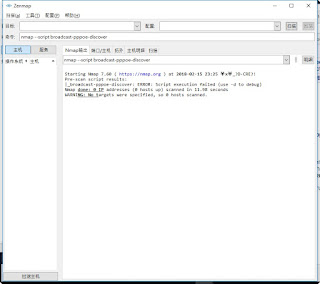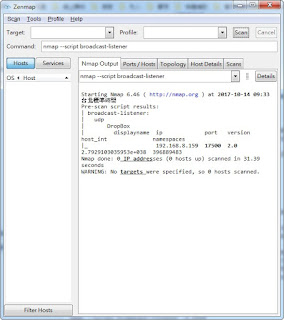broadcast-pppoe-discover 說明
尋找網路上 PPPoE server
官方: https://nmap.org/nsedoc/scripts/broadcast-pppoe-discover.html
內文:
local nmap = require "nmap"
local pppoe = require "pppoe"
local stdnse = require "stdnse"
local table = require "table"
description = [[
Discovers PPPoE (Point-to-Point Protocol over Ethernet) servers using
the PPPoE Discovery protocol (PPPoED). PPPoE is an ethernet based
protocol so the script has to know what ethernet interface to use for
discovery. If no interface is specified, requests are sent out on all
available interfaces.
As the script send raw ethernet frames it requires Nmap to be run in privileged
mode to operate.
]]
---
-- @usage
-- nmap --script broadcast-pppoe-discover
--
-- @output
-- | broadcast-pppoe-discover:
-- | Server: 08:00:27:AB:CD:EF
-- | Version: 1
-- | Type: 1
-- | TAGs
-- | AC-Name: ISP
-- | Service-Name: test
-- | AC-Cookie: e98010ed8c59a870f0dc94d56ac1095dd321000001
-- |_ Host-Uniq: 7f8552a0
author = "Patrik Karlsson"
license = "Same as Nmap--See https://nmap.org/book/man-legal.html"
categories = {"broadcast", "safe"}
prerule = function()
if not nmap.is_privileged() then
stdnse.verbose1("not running for lack of privileges.")
return false
end
return true
end
local function fail(err)
return stdnse.format_output(false, err)
end
local function discoverPPPoE(helper)
local status, err = helper:connect()
if ( not(status) ) then
return false, err
end
local status, pado = helper:discoverInit()
if ( not(status) ) then
return false, pado
end
status, err = helper:discoverRequest()
if ( not(status) ) then
return false, err
end
return true, pado
end
-- Gets a list of available interfaces based on link and up filters
--
-- @param link string containing the link type to filter
-- @param up string containing the interface status to filter
-- @return result table containing the matching interfaces
local function getInterfaces(link, up)
if( not(nmap.list_interfaces) ) then return end
local interfaces, err = nmap.list_interfaces()
local result
if ( not(err) ) then
for _, iface in ipairs(interfaces) do
if ( iface.link == link and iface.up == up ) then
result = result or {}
result[iface.device] = true
end
end
end
return result
end
action = function()
local interfaces
-- first check if the user supplied an interface
if ( nmap.get_interface() ) then
interfaces = { [nmap.get_interface()] = true }
else
interfaces = getInterfaces("ethernet", "up")
end
for iface in pairs(interfaces) do
local helper, err = pppoe.Helper:new(iface)
if ( not(helper) ) then
return fail(err)
end
local status, pado = discoverPPPoE(helper)
if ( not(status) ) then
return fail(pado)
end
helper:close()
local output = { name = ("Server: %s"):format(stdnse.format_mac(pado.mac_srv)) }
table.insert(output, ("Version: %d"):format(pado.header.version))
table.insert(output, ("Type: %d"):format(pado.header.type))
local tags = { name = "TAGs" }
for _, tag in ipairs(pado.tags) do
local name, val = pppoe.PPPoE.TagName[tag.tag], tag.decoded
table.insert(tags, ("%s: %s"):format(name, val))
end
table.insert(output, tags)
return stdnse.format_output(true, output)
end
end
官方: https://nmap.org/nsedoc/scripts/broadcast-pppoe-discover.html
內文:
local nmap = require "nmap"
local pppoe = require "pppoe"
local stdnse = require "stdnse"
local table = require "table"
description = [[
Discovers PPPoE (Point-to-Point Protocol over Ethernet) servers using
the PPPoE Discovery protocol (PPPoED). PPPoE is an ethernet based
protocol so the script has to know what ethernet interface to use for
discovery. If no interface is specified, requests are sent out on all
available interfaces.
As the script send raw ethernet frames it requires Nmap to be run in privileged
mode to operate.
]]
---
-- @usage
-- nmap --script broadcast-pppoe-discover
--
-- @output
-- | broadcast-pppoe-discover:
-- | Server: 08:00:27:AB:CD:EF
-- | Version: 1
-- | Type: 1
-- | TAGs
-- | AC-Name: ISP
-- | Service-Name: test
-- | AC-Cookie: e98010ed8c59a870f0dc94d56ac1095dd321000001
-- |_ Host-Uniq: 7f8552a0
author = "Patrik Karlsson"
license = "Same as Nmap--See https://nmap.org/book/man-legal.html"
categories = {"broadcast", "safe"}
prerule = function()
if not nmap.is_privileged() then
stdnse.verbose1("not running for lack of privileges.")
return false
end
return true
end
local function fail(err)
return stdnse.format_output(false, err)
end
local function discoverPPPoE(helper)
local status, err = helper:connect()
if ( not(status) ) then
return false, err
end
local status, pado = helper:discoverInit()
if ( not(status) ) then
return false, pado
end
status, err = helper:discoverRequest()
if ( not(status) ) then
return false, err
end
return true, pado
end
-- Gets a list of available interfaces based on link and up filters
--
-- @param link string containing the link type to filter
-- @param up string containing the interface status to filter
-- @return result table containing the matching interfaces
local function getInterfaces(link, up)
if( not(nmap.list_interfaces) ) then return end
local interfaces, err = nmap.list_interfaces()
local result
if ( not(err) ) then
for _, iface in ipairs(interfaces) do
if ( iface.link == link and iface.up == up ) then
result = result or {}
result[iface.device] = true
end
end
end
return result
end
action = function()
local interfaces
-- first check if the user supplied an interface
if ( nmap.get_interface() ) then
interfaces = { [nmap.get_interface()] = true }
else
interfaces = getInterfaces("ethernet", "up")
end
for iface in pairs(interfaces) do
local helper, err = pppoe.Helper:new(iface)
if ( not(helper) ) then
return fail(err)
end
local status, pado = discoverPPPoE(helper)
if ( not(status) ) then
return fail(pado)
end
helper:close()
local output = { name = ("Server: %s"):format(stdnse.format_mac(pado.mac_srv)) }
table.insert(output, ("Version: %d"):format(pado.header.version))
table.insert(output, ("Type: %d"):format(pado.header.type))
local tags = { name = "TAGs" }
for _, tag in ipairs(pado.tags) do
local name, val = pppoe.PPPoE.TagName[tag.tag], tag.decoded
table.insert(tags, ("%s: %s"):format(name, val))
end
table.insert(output, tags)
return stdnse.format_output(true, output)
end
end


留言
張貼留言